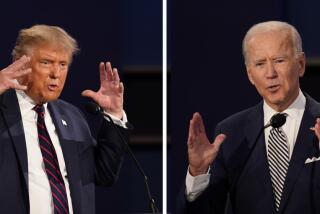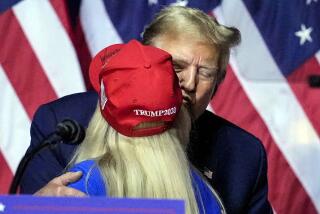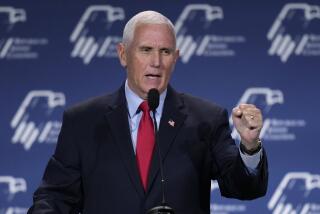Their debate might not matter much, but Mike Pence and Tim Kaine would be key White House players

Mike Pence and Tim Kaine face off on the debate stage for the first time Tuesday tonight. Here’s what to expect.
One man entered the national stage this summer as the reassuringly dull half of the GOP ticket. The other, the Democratic No. 2, is a career politician who proudly called himself boring.
Yet as Indiana Gov. Mike Pence and Virginia Sen. Tim Kaine prepare to face off Tuesday in their only vice presidential debate, they are vying for an office that has gained increasing clout in recent administrations.
In Pence’s case, the role could expand even more than it already has over the last 40 years, given Donald Trump’s lack of government experience. Kaine could find himself in a more complicated position, competing for influence in Hillary Clinton’s White House against her husband, former President Bill Clinton.
But neither man, if elected, will be relegated strictly to attending to funerals, maintaining preparedness should the president fall ill or absorbing mockery on late-night TV shows. The office, once housed outside the White House in the Executive Office Building or the Senate and seen purely as a stand-in job, has now cemented itself as an integral part of running the country, with more access and influence than almost anyone in the president’s orbit gets.
Election 2016 | Live coverage on Trail Guide | Sign up for the newsletter | The race to 270
The job’s heightened stature derives from a number of factors, including the increasing complexity of the president’s job, a political shift in how running mates are selected, and the trust individual presidents have placed in their understudies.
“It would be difficult to throw the vice president out of the West Wing or to refuse to break bread with them once a week,” said Joel K. Goldstein, a St. Louis University law professor and author of “The White House Vice Presidency: The Path to Significance, Mondale to Biden.”
Goldstein pointed to Walter Mondale in the late 1970s as the first modern vice president, who attended a weekly lunch with President Carter and had the power to invite himself to his meetings. Mondale and those who followed all had varying levels of responsibility, both to give the president unvarnished advice or to lead initiatives; but none relinquished the core access.
Once chosen to provide ideological or geographical balance, running mates are now usually picked to fill in gaps in the presidential candidate’s experience or expertise. Al Gore won so much trust during Bill Clinton’s first term that Elaine Kamarck, a Gore aide, recalled glimpsing Gore wagging his finger in Clinton’s face as he lectured him about diplomacy in Bosnia, something few if any other advisors would dare do.
“They were alone and this was their way of helping each other,” Kamarck said, adding a parallel story of Clinton helping Gore to connect better with voters. “In the first term, that was one of the best working relationships I’d ever seen.”
Their relationship soured in the second term as Clinton faced impeachment and Gore pursued an unsuccessful White House bid.
Kamarck, a senior fellow at the Brookings Institution who published a paper on vice presidential power last week, said Dick Cheney attained his well-documented role leading intelligence and foreign policy in the White House by controlling the policy options that were put on the desk of President George W. Bush, who came in as a governor with no foreign policy background. Cheney had served as secretary of defense.
Pence could win similar influence on several fronts, depending on his skill and ambition and the level of trust he gains from Trump, who would enter the job with less policy experience than anyone in modern history. Pence could command expertise on several issues. Not only is he a sitting governor, but he is also a former member of Congress and a politician trusted by many movement conservatives and evangelicals.
On the campaign trail, Pence has opted for the role of explainer, trying to tamp down Trump’s rougher edges in ways that Trump himself has been unwilling to do. Pence has deviated little since his introduction in July, when he contradicted his own statements and policies to defend Trump on issues such as banning all Muslims from entering the country and taking a hard line against trade agreements.
“What I hear Donald Trump saying is, “Let’s — let’s look at these trade agreements and reconsider them and renegotiate them,’” Pence, who backed the North American Free Trade Agreement, said on “60 Minutes” during his initial interview with Trump.
Kaine, who served as mayor of Richmond and governor of Virginia before winning a Senate seat, has also had to finesse old positions, like his support for some restrictions on abortion not favored by Clinton.
But his challenges in the White House would be different than Pence’s. Not only would Clinton come to the job with unusually deep experience, but she would have the counsel of her husband, whose appetite for giving freelance advice is well-known.
“We’ve never had this before, with a former president being in the White House, and Hillary has indicated that he will have an active role,” said Charles Burson, a former chief of staff to Gore.
“Kaine is going to have to carve a role between he and Clinton and the president,” Burson added. “It’s almost to me a triangle, where usually it’s the president and the vice president.”
Hillary Clinton promised in a recent People magazine interview that she would view Kaine as a key player, describing the job in similar terms to the one Joe Biden now has under President Obama.
“I’ve seen it up close and know how important it is,” Clinton said. “This is the person — the last person in the room. This is the person that you see every day, that you sit down and talk with. And yes, there’s a lot of serious stuff to talk about, but kidding each other, getting some release from all of the constant stress, that’s a big part of it, too.”
Kamarck said assigning specific portfolios to Kaine and Bill Clinton could alleviate the tension between the two men. During Bill Clinton’s first term, he told Gore to lead the Reinventing Government initiative while tasking Hillary Clinton, one of the most politically active first ladies in history, to lead an overhaul of the healthcare system, which ultimately failed.
Clinton told People that Kaine would be a top player in programs designed to improve civic life.
But will that be enough for the senator, who serves on the foreign relations committee and is believed to have his own aspirations to run for president? And what would happen if Pence, another potential presidential candidate, finds himself shut out by Trump, who is known to rely on a relatively small group of loyalists?
Tough luck, former advisors say. For all the changes the job has undergone in recent decades, frustration with the limits of its power remains a key component.
“Look, there’s a big leap between vice president and president, and everybody understands that,” Burson said. “Those frustrations, if they’re there, need to be deferred.”
Twitter: @noahbierman
Trump wanted to fire women who weren’t pretty enough, say employees at his California golf club
How much do allies pay for U.S. troops? A lot more than Donald Trump says
Trump says former Miss Universe was tied to a murder attempt. So what did happen in Venezuela?
More to Read
Get the L.A. Times Politics newsletter
Deeply reported insights into legislation, politics and policy from Sacramento, Washington and beyond. In your inbox three times per week.
You may occasionally receive promotional content from the Los Angeles Times.







